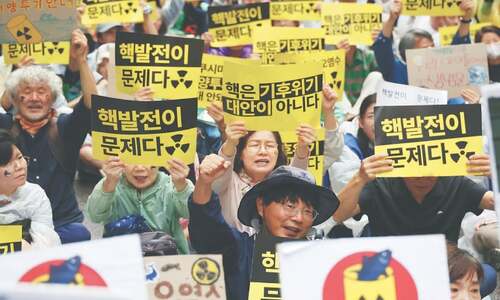TOKYO: Japan started releasing treated radioactive water from the wrecked Fukushima nuclear power plant into the Pacific Ocean on Thursday, a polarising move that prompted China to announce an immediate blanket ban on all aquatic products from Japan.
China is “highly concerned about the risk of radioactive contamination brought by... Japan’s food and agricultural products,” the customs bureau said in a statement.
The Japanese government signed off on the plan two years ago and it was given a green light by the UN nuclear watchdog last month. The discharge is a key step in decommissioning the Fukushima Daiichi plant after it was destroyed by a tsunami in 2011.
Plant operator Tokyo Electric Power (Tepco) said the release began at 1:03pm local time and it had not identified any abnormalities.
Tokyo criticises Beijing for ‘scientifically unfounded claims’; Seoul police arrest 16 for entering Japanese embassy
However, China reiterated its firm opposition to the plan and said the Japanese government had not proved that the water discharged would be safe.
Tokyo has in turn criticised China for spreading “scientifically unfounded claims.” It maintains the water release is safe, noting that the International Atomic Energy Agency (IAEA) has also concluded that the impact it would have on people and the environment was “negligible.”
Japan has requested that China immediately lift its import ban on aquatic products and seeks a discussion on the impact of the water release based on science, Prime Minister Fumio Kishida told reporters.
Japan exported about $600 million worth of aq uatic products to China in 2022, making it the biggest market for Japanese exports, with Hong Kong second. Sales to China and Hong Kong accounted for 42 per cent of all Japanese aquatic exports in 2022, according to government data.
China customs did not give details on the specific aquatic products impacted by the ban and did not immediately respond to a request for comment.
Decades long process
The Fukushima Daiichi plant was destroyed in March 2011 after a massive 9.0 magnitude earthquake generated powerful tsunami waves causing meltdowns in three reactors.
The first discharge totalling 7,800 cubic metres — the equivalent of about three Olympic swimming pools of water — will take place over about 17 days.
According to Tepco test results released on Thursday, that water contained about up to 63 becquerels of tritium per litre, below the World Health Organization drinking water limit of 10,000 becquerels per litre. A becquerel is a unit of radioactivity.
The IAEA also released a statement saying its independent on-site analysis had confirmed the tritium concentration was below the limit.
“There are not going to be any health effects There is no scientific reason to ban imports of Japanese food whatsoever,” said Geraldine Thomas, former professor of molecular pathology at London’s Imperial College.
Separately from China, Hong Kong and Macau have announced their own ban starting Thursday, which covers Japanese seafood imports from 10 regions.
South Korean Prime Minister Han Duck-soo said import bans on Fukushima fisheries and food products will stay in place until public concerns were eased.
Japan will conduct monitoring around the water release area and publish results weekly starting on Sunday, Japan’s environment minister said. The release is estimated to take about 30 years.
Protests
In Hong Kong, Jacay Shum, a 73-year-old activist, held up a picture portraying IAEA head Rafael Grossi as the devil.
“Japan’s actions in discharging contaminated water are very irresponsible, illegal, and immoral,” said Shum, who was among a group of about 100 marchers.
South Korean police arrested at least 16 protesters who entered the Japanese embassy in Seoul, although South Korea’s government has said its own assessment found no problems with the scientific and technical aspects of the release.
Published in Dawn, August 25th, 2023














































Dear visitor, the comments section is undergoing an overhaul and will return soon.